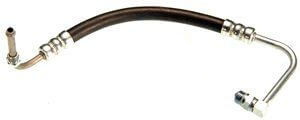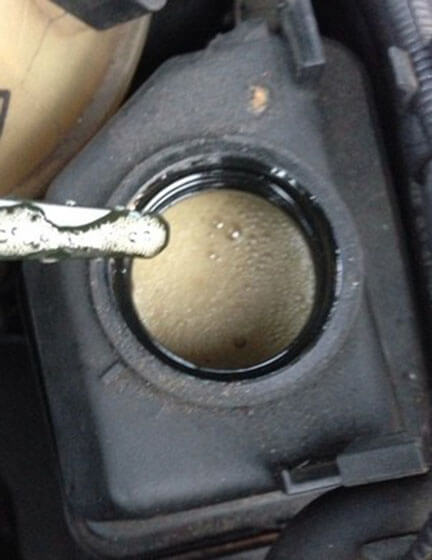Steering noise when turning
Diagnose steering noise when turning
The most common cause of steering noise when turning is low power steering fluid. When power steering fluid is low, the power steering pump makes a whining or groaning sound. Locate the power steering reservoir and check the power steering fluid level with the dipstick or by checking the level on the side of the translucent reservoir.
Power steering systems are sealed, so if you’re low on fluid, it’s because you have a leak. Refilling the system without fixing the leak is a recipe for very expensive repairs later on. It never pays to ignore a power steering leak. Get it fixed ASAP.
The wrong power steering fluid can cause steering noise when turning
Not all power steering fluids are the same and not all “universal” fluids are

Can you use this power steering fluid in your vehicle. Check your owner’s manual for the fluid specifications. If that specification is listed on the bottle, you can use it. If not, DON’T.
actually universal. The fluid you use MUST be compatible with the types of seals used in your power steering system. Using the wrong fluid can cause seal damage and accelerated wear. Check your owner’s manual for the right power steering fluid specification. Again, DON’T use a universal or generic fluid in place of a manufacturer listed fluid.
Contaminated power steering fluid can also cause steering noise when turning.
Acura — Honda P/S fluid
Audi — Pentosin CHF 7.1, CHF 11S or CHF 202, depending on year.
BMW — Pentosin CHF 7.1 or CHF 11S, depending on year
Chrysler — P/S fluid (pre-1998) or ATF+4 1998 and later) or Pentosin CHF 11S
Daewoo — Dexron II or III
Dodge Sprinter — Pentosin CHF 11S
Ford/Lincoln/Mercury — Mercon ATF
GM — P/S fluid
Honda — Honda P/S fluid
Hyundai — P/S fluid 3 or Dexron II
Jaguar — Pentosin CHF 11S or Dexron III
Jeep — WK Hydraulic, ATF+4 or P/S fluid (depending on model)
Infiniti — Dexron III
Isuzu — Dexron II or III
Kia — P/S fluid or Dexron III (depending on model)
Land Rover — Dexron II or III
Lexus — Dexron II or III
Mazda — Dexron III
Mercedes-Benz — Pentosin CHF 11S or P/S fluid
Mini — Pentosin CHF 11S
Mitsubishi — P/S fluid or Dexron II
Nissan — 1994 and later… Pentosin CHF 11S
Nissan/Datsun — Pre-1994… Dexron III
Porsche — Pentosin CHF 11S or CHF 202
Rolls Royce — Pentosin CHF 11S
Saab — Varies by application
Saturn — P/S fluid
Scion — Dexron II or III
Subaru — Dexron II or III
Suzuki — Dexron II or III
Toyota — Dexron II or III
Volkswagen — P/S fluid, Pentosin CHF 11S, Pentosin CHF 202 (varies by year)
Volvo — Pentosin CHF 7.1, CHF 11S, CHF 202 (varies by year)
NOTE: Pentosin 7.1 is mineral based, while Pentosin CHF 202 and CHF 11S are synthetic fluids. Never mix mineral based and synthetic fluids
Replacement power steering hoses can cause steering noise when turning
Some economy replacement hoses are made from substandard thin wall materials that can transfer harmonic from the pump through the entire system. These replacement lines make a whining or  high pitched noise. If you’re having power steering hoses replaced, demand top quality professionally rated power steering hoses. If you opt to save money by installing a cheap hose and it makes noise, you’ll have to replace it again and pay for labor a second time.
high pitched noise. If you’re having power steering hoses replaced, demand top quality professionally rated power steering hoses. If you opt to save money by installing a cheap hose and it makes noise, you’ll have to replace it again and pay for labor a second time.
Missing power steering hose clamps can make steering noise when turning
Car makers never install unneeded parts. If they’ve used a hose clamp to secure a power steering line to the body, there’s a reason for it. If you or the shop installs a new hose but leaves off a hose clamp, that hose can vibrate against the body and cause steering noise when turning.
Foaming causes steering noise when turning
Leaks in power steering component seals or hoses can cause air to enter

Foam in power steering fluid indicates air in the system
the system and that air gets churned into the fluid. Since power steering fluid isn’t compress able, any air will cause noise and foaming.
High pitched screech noise when turning
This type of noise is usually caused by a slipping power steering belt or a loose serpentine belt. . The whining. Power steering demands a lot of hydraulic pressure and when the belt is loose during turns, it will slip across the pulley, making a horrible high pitched screeching sound. NEVER ever apply belt dressing or any type of lubricant to fix this type of problem. Those products will only provide temporary relief from the noise and will eventually destroy the belt and your pulleys. See these posts for more information on how to check an automatic belt tensioner and other types of belts.
https://ricksfreeautorepairadvice.com/diagnose-belt-noise/
Grinding or popping noise when turning
Worn strut bearings can make a grinding or popping noise when turning. If your struts have more than 80,000 miles on them, you should take this seriously. Strut systems don’t have an upper control arm and ball joint. Instead, they rely on a bearing located in the upper strut mount. As the bearing ages, the individual ball bearings can lose their grease-packing, wear and cause noise. This type of noise is often misdiagnosed as a steering problem. Ask the shop to use an electronic chassis ear setup to properly diagnose this type of noise to avoid replacing good steering parts.
Loose brake calipers and worn wheel bearings can cause noise when turning
Check that the caliper bolts are tightened and conduct a wheel bearing test to detect wear.
Worn CV joints can cause noise when turning
A worn CV joint can make a clicking or popping noise when making tight turns at slow speeds. Check the condition of the rubber CV boot. If it’s torn or missing, replace the axle immediately. Driving with a torn or missing boot can cause the CV join to fail and damage other expensive engine and transmission components.
©, 2017 Rick Muscoplat
Posted on by Rick Muscoplat